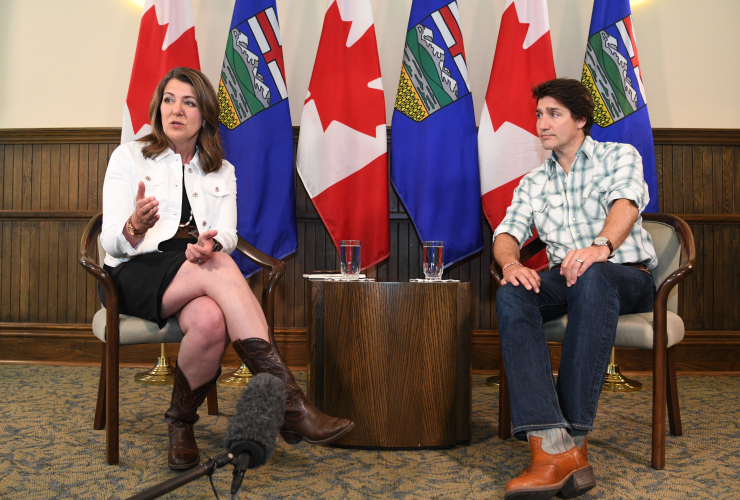Support journalism that lights the way through the climate crisis
On Monday, federal politicians will return to Canada’s capital and pick up where they left off in June.
Plenty of political distractions and grandstanding are sure to accompany politicians’ return to the House of Commons — but there are also incoming climate policies with a suite of repercussions.
Some big-ticket items — like updates to Canada’s main environmental law, which enshrines citizens’ right to a healthy environment — are done and dusted, but there is still lots to watch for when Parliament reconvenes on Sept. 18.
Sustainable jobs act
The federal government’s bill aiming to create jobs in the low-carbon economy has a long journey before it can become law. Tabled on June 14, this long-awaited legislation must make its way through the House of Commons and then through the Senate.
The bill is currently awaiting second reading in the House of Commons, where it will be debated and then likely referred to a parliamentary committee, which will study it and make amendments. In its current form, the bill would require the government to publish sustainable job action plans every five years and create a partnership council to provide ongoing advice to the government and ensure workers have an avenue to contribute to the plans over time.
“It's going to be incredibly important to us to make sure that we have at least a third of the seats on the sustainable jobs partnership council,” Bea Bruske, president of the Canadian Labour Congress (CLC), said in a previous interview with Canada’s National Observer.
Organized labour was involved in shaping the act, and Bruske said the legislation remains one of the CLC’s top priorities heading into this parliamentary session.
Oil and gas emissions cap
A lot of the big issues to watch aren’t playing out in clause-by-clause amendments to bills. You can expect the announcement and finalization of various regulations to result in cheers, criticism and, in the case of several provincial premiers, outright hostility.
The oil and gas emissions cap might be one of the most anticipated — and inflammatory — of these regulations.
Canadians can expect draft regulations to cap emissions from the oil and gas sector by the end of 2023, with final regulations targeted for mid-2024, federal Environment Minister Steven Guilbeault told Reuters on July 27.
Alberta’s United Conservative Party Premier Danielle Smith said it is “essentially a production cap, which we don’t think is realistic or feasible,” but the federal government has emphasized the regulations will not cap how much oil and gas companies can produce, only the greenhouse gases they can emit during production.
Canada’s oil and gas industry is consistently the highest-emitting economic sector, responsible for 28 per cent of national emissions in 2021, according to the country’s annual inventory of greenhouse gas emissions. This does not include emissions from burning the oil and gas Canada produces, which is when the majority of planet-warming emissions are released into the atmosphere.
Clean electricity regulations
Ottawa’s draft clean electricity regulations are another flashpoint between federal and provincial governments. The draft regulations, published Aug. 10, are a critical step towards Canada achieving its climate goals because a clean electricity grid also enables emission reductions in countless other sectors — for example, heating buildings.
The final regulations are expected to be published in 2024, according to the federal government’s website. Feedback on the draft regulations can be submitted from now until Nov. 2, 2023.
In their current form, the regulations would require electricity systems to reach net-zero emissions by 2035 –– with some exceptions for natural gas plants built before 2025 and gas plants outfitted with carbon capture technology.
“Under no scenario will the Government of Alberta permit the implementation of the proposed federal electricity regulations or contemplated oil and gas emissions cap,” the Alberta premier said in an Aug. 30 statement. Smith says Ottawa “has no constitutional authority” to regulate those areas and warned the government not to test her resolve on the matter. Her steadfast opposition to these regulations sets the stage for a federal-provincial working group rife with conflict as Ottawa tries to find common ground with a UCP government making hay from fighting federal energy policies.
Bill to address environmental racism in the home stretch
A private member’s bill that would require the federal government to examine the links between race, socio-economic status and environmental risk is in the home stretch; all that remains is one final vote in the Senate. Green Party MP Elizabeth May sponsored the bill after a previous, essentially identical version made it all the way to the final stage of debate in the House of Commons before dying on the order paper when the 2021 federal election was called.
Private member’s bills seldom become law, but C-226 just has to pass a final vote in the Senate before it receives royal assent. If it becomes law, C-226 would compel the environment and climate change minister to develop a national strategy to address the harms caused by environmental racism.
Zero-emission vehicles and methane regulations
The federal government is in a phase where it is implementing lots of regulations, and it is expected to finalize zero-emission vehicle regulations by the end of this year. The draft rules include sales targets starting in model year 2026 — at which point, 20 per cent of new passenger vehicles must be zero-emission vehicles — and reaching full effect in 2035 with a 100 per cent sales mandate. Battery electric, plug-in hybrid and fuel cell electric vehicles are all classified as ZEVs under the regulation.
Canadians can also expect updated regulations to reduce methane emissions this year. Methane is a short-lived, potent greenhouse gas with about 80 times the warming potential of carbon dioxide in the first 20 years after being released into the atmosphere. Cutting Canada’s methane emissions — the largest share of which comes from the oil and gas industry — is one of the fastest and most cost-effective ways to reduce emissions. However, multiple studies show methane emissions are underestimated.
In 2021, the federal government pledged to create a global centre for excellence on methane detection and elimination to address the reporting gaps. Three NDP MPs — Laurel Collins, Charlie Angus and Taylor Bachrach — are calling on the federal government to fully fund this centre for excellence in the upcoming Fall Economic Statement, according to a letter they sent Prime Minister Justin Trudeau on Sept. 14.
National biodiversity strategy
A national strategy to halt and reverse biodiversity loss in Canada is expected by the end of 2023, according to Environment and Climate Change Canada, the department heading up the initiative. The development of this national strategy came out of a historic international agreement inked last December in Montreal. By signing onto the Kunming-Montreal Global Biodiversity Framework, countries committed to protect 30 per cent of land and oceans by 2030 and reaffirmed Indigenous Peoples’ right to free, prior and informed consent for development projects on their territories.
Natasha Bulowski / Local Journalism Initiative / Canada’s National Observer
It looks like there's some
It looks like there's some positive (although modest in terms of tackling the climate crisis) legislation coming down the pipe. I hope this federal government stays in power long enough to enact it.
Indeed. In addition is the
Indeed. In addition is the very important childcare program on the books, a continuing belief in medical science and more. It could be better, a lot better, but it's the best we can attain under the current political circumstances.
All indications point to a Poilievre government laying waste to all of it and with no realistic plans for anything beyond laughable economic policies on bitcoin, medical science, outright climate denial -- oh, sorry, a slightly better climate confusion. But the Conservatives do have a treasure trove of rhetoric about woke rich socialist urban Laurentian Elites.
Poilievre himself is a wealthy urban Laurentian Elite with no expertise in anything, ironically not even truck driving. But he'll never admit that..
National Observer, please
National Observer, please stop with the unconsidered notion that there is such a thing as clean energy. Mining, manufacturing and a growth economy are not going to save the world, they are simply going to compound the problems humanity. Surely you are aware of the ecological disaster that mining is, or have you forgotten suddenly? More manufacturing? Nuclear? More growth? All of these so-called green solutions are the most comprehensive greenwashing we have seen yet. And who has been the cheering section? Environmental organizations with blinkers on. Please research this properly, THINK, and reconsider your enthusiasm for what has been easily sold to industry and governments, but for which we as those concerned about the environment should not be cheering. We need to live smaller, want less, think carefully before we procreate, and THINK before we mindlessly support patently destructive "solutions".
If you wrote that on a
If you wrote that on a computer, eat your meals from stainless steel utensils and porcelain china, own a car or bike, take transit, wear clothes, eat food, and live in a house with running water and electricity, then you are participating in mining, manufacturing and a growth economy.
But your heart's in the right place.






Comments